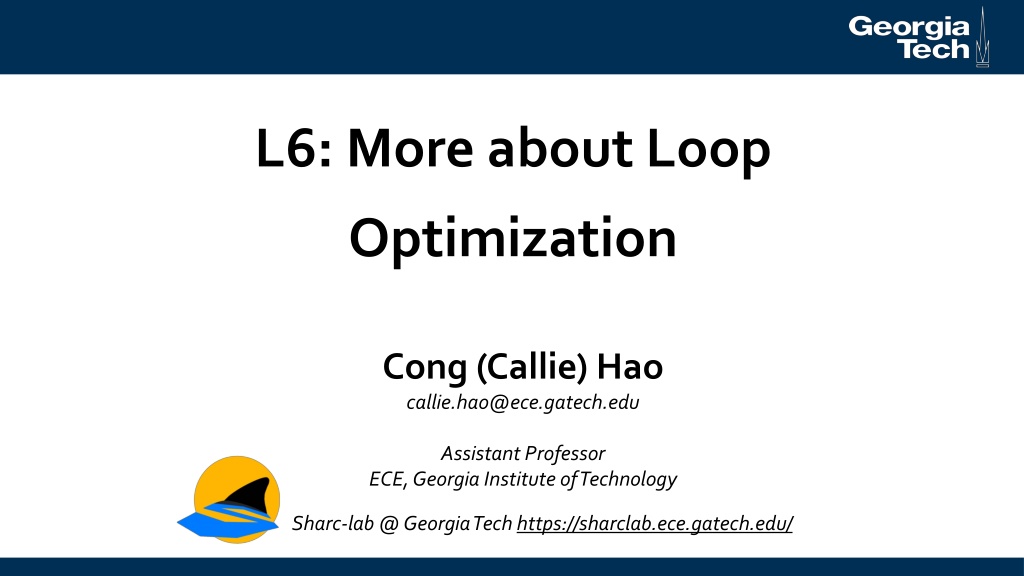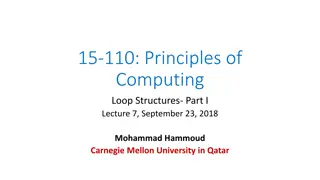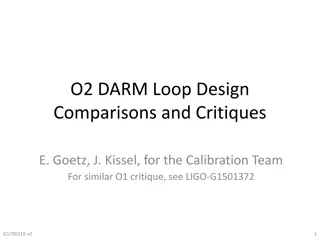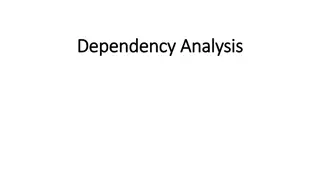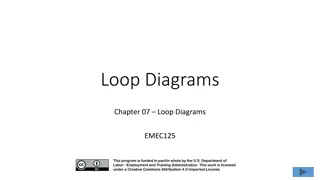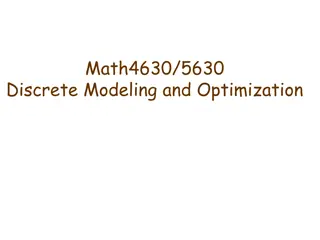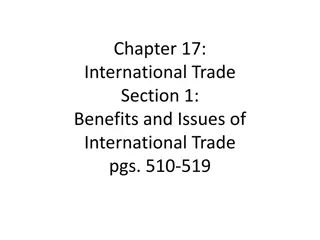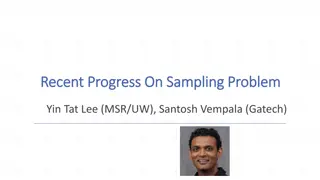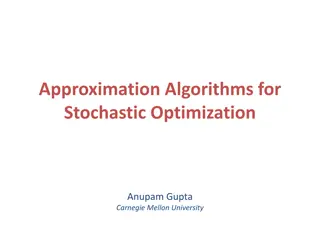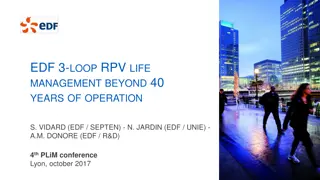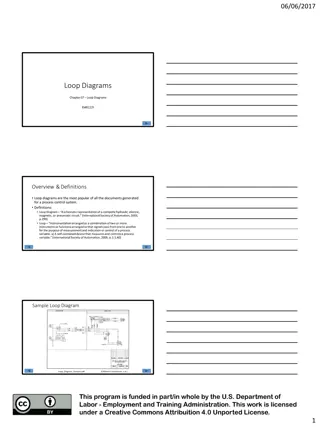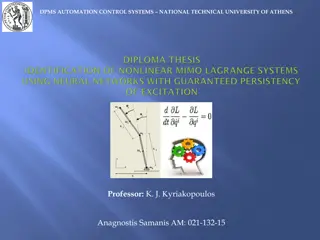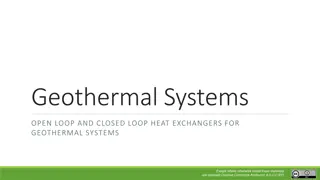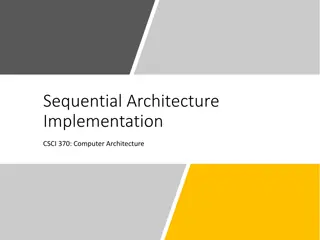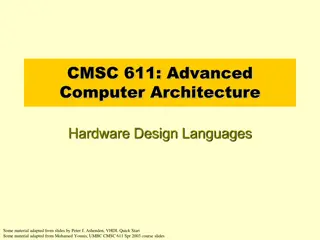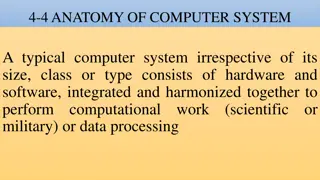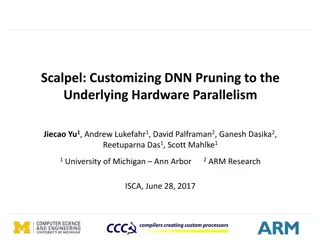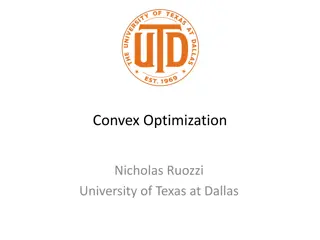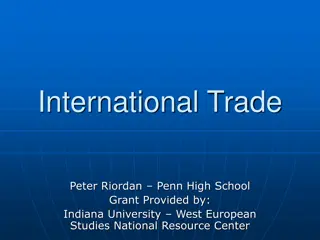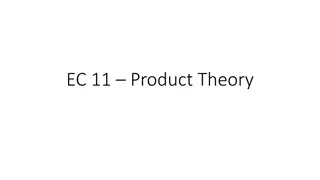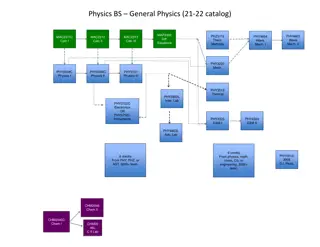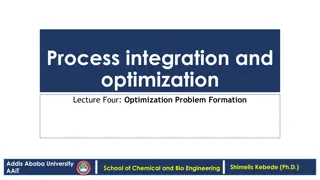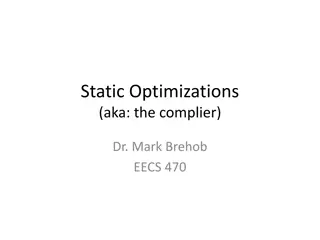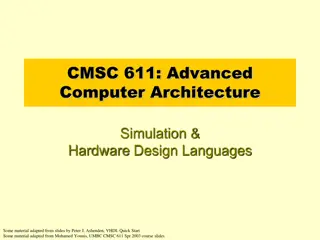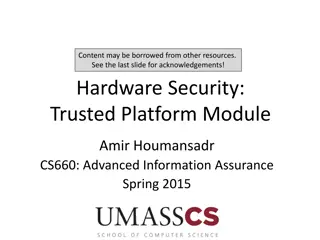Insights into Loop Optimization and Hardware Specialization with HLS
Learn about loop optimization and hardware specialization with High-Level Synthesis (HLS) from the expertise of Assistant Professor Callie Hao at Georgia Institute of Technology. The content covers topics such as array partitioning, memory parallelism, performance gains through specialization, and the role of HLS in optimizing compute tasks. Gain valuable insights into optimizing loops for improved hardware efficiency and explore the nuances of data type, interface, memory, and compute specializations in HLS for enhanced performance.
Download Presentation

Please find below an Image/Link to download the presentation.
The content on the website is provided AS IS for your information and personal use only. It may not be sold, licensed, or shared on other websites without obtaining consent from the author. Download presentation by click this link. If you encounter any issues during the download, it is possible that the publisher has removed the file from their server.
E N D
Presentation Transcript
L6: More about Loop Optimization Cong (Callie) Hao callie.hao@ece.gatech.edu Assistant Professor ECE, Georgia Institute of Technology Sharc-lab @ Georgia Tech https://sharclab.ece.gatech.edu/
More HLS Resources This link has everything you need to know about HLS o https://docs.xilinx.com/r/en-US/ug1399-vitis-hls/Getting-Started-with- Vitis-HLS o I can be 100% substituted by this link A serious correction: I cannot be replaced !!! Many of the examples are out-of-date or incorrect I verified A LOT the entire weekend! Either bugs or unreproducible! Callie Hao | Sharc-lab @ Georgia Institute of Technology https://sharclab.ece.gatech.edu/ 2
Hardware Specialization with HLS Where does performance gain come from? Specialization! Data type specialization o Arbitrary-precision fixed-point, custom floating-point Interface/communication specialization o Streaming, memory-mapped I/O, etc. Memory specialization o Array partitioning, data reuse, etc. Compute specialization o Unrolling, pipelining, dataflow, multithreading, etc. Architecture specialization o Pipelined, recursive, hybrid, etc. The Three Musketeers (i) Array partition (ii) Loop unroll (iii) Loop pipeline Callie Hao | Sharc-lab @ Georgia Institute of Technology https://sharclab.ece.gatech.edu/ 3
Array Partition Memory Parallelism Initially, an array is mapped to one (or more) block(s) of RAM (or BRAM on FPGA) o One block of RAM has at most two ports o At most two read/write operations can be done in one clock cycle Parallelism is 2 (too low) An array can be partitioned and mapped to multiple blocks of RAMs A[0] A[1] A[2] A[3] A[4] A[5] A[6] A[7] A[0] A[4] A[1] A[5] A[2] A[6] A[3] A[7] 4 RAM blocks can be accessed simultaneously! 1 RAM block Callie Hao | Sharc-lab @ Georgia Institute of Technology https://sharclab.ece.gatech.edu/ 4
Array Partition Memory Parallelism Initially, an array is mapped to one (or more) block(s) of RAM (or BRAM on FPGA) o One block of RAM has at most two ports o At most two read/write operations can be done in one clock cycle Parallelism is 2 (too low) An array can be partitioned and mapped to multiple blocks of RAMs o Can also be partitioned into individual elements and mapped to registers Only if your array is small otherwise the tool will give up A[0] A[1] A[2] A[3] A[4] A[5] A[6] A[7] A[0] A[4] A[1] A[5] A[0] A[1] A[2] A[3] A[4] A[5] A[6] A[7] A[0] A[1] A[2] A[3] A[0] A[4] A[1] A[5] OR A[2] A[6] A[3] A[7] A[4] A[5] A[6] A[7] A[2] A[6] 4 RAM blocks can be accessed simultaneously! A[3] A[7] All registers 1 RAM block Callie Hao | Sharc-lab @ Georgia Institute of Technology https://sharclab.ece.gatech.edu/ 5
Loop Unrolling Loop unrolling to expose higher parallelism and achieve shorter latency o Pros Decrease loop overhead Increase parallelism for scheduling o Cons Increase operation count, which may negatively impact area, power, and timing Original Loop Unrolled Loop A[0] = B[0] + C[0]; A[1] = B[1] + C[1]; A[2] = B[2] + C[2]; ... for (int i = 0; i < N; i++) #pragma HLS unroll A[i] = B[i] + C[i]; N x m cycles m cycle Assume A[i] = B[i] + C[i] takes m cycle Only if A, B, and C are fully partitioned! Callie Hao | Sharc-lab @ Georgia Institute of Technology https://sharclab.ece.gatech.edu/ 6
Loop Pipelining Loop pipelining is one of the most important optimizations for high-level synthesis o Allows a new iteration to begin processing before the previous iteration is complete o Key metric: Initiation Interval (II) in # cycles for (i = 0; i < N; ++i) #pragma HLS pipeline p[i] = x[i] * y[i]; x[i] y[i] ld ld II = 1 ld st i=0 ld st i=1 st ld st i=2 p[i] ld i=3 st ld Load st Store cycles Callie Hao | Sharc-lab @ Georgia Institute of Technology https://sharclab.ece.gatech.edu/ 7
Put-together: Pipeline + Unroll +Partition The three techniques are frequently used together to boost computation efficiency RAM block 1 A[0][0] A[1][0] A[M-1][0] A[0][1] A[1][1] A[M-1][1] A[0][N-1] A[1][N-1] A[M-1][N-1] A for (int i = 0; i < N; i++) { RAM block 2 B[0][0] B for (int j = 0; j < M; j++) { A[i][j] = B[i][j] * C[i][j]; } } RAM block 3 C[0][0] C Callie Hao | Sharc-lab @ Georgia Institute of Technology https://sharclab.ece.gatech.edu/ 8
Put-together: Pipeline + Unroll +Partition The three techniques are frequently used together to boost computation efficiency RAM block 1 Compute in parallel A[0][0] A[1][0] A[M-1][0] A[0][1] A[1][1] A[M-1][1] A[0][N-1] A[1][N-1] A[M-1][N-1] for (int i = 0; i < N; i++) { RAM block 2 B[0][0] Compute in parallel for (int j = 0; j < M; j++) { #pragma HLS unroll A[i][j] = B[i][j] * C[i][j]; } } RAM block 3 C[0][0] Compute in parallel Memory ports limited by 2 Need to partition Callie Hao | Sharc-lab @ Georgia Institute of Technology https://sharclab.ece.gatech.edu/ 9
Put-together: Pipeline + Unroll +Partition The three techniques are frequently used together to boost computation efficiency Block 2 Block 1 Block N A[0][N-1] A[1][N-1] A[M-1][N-1] A[0][0] A[1][0] A[M-1][0] A[0][1] A[1][1] A[M-1][1] #pragma HLS array_partition variable=A dim=2 complete #pragma HLS array_partition variable=B dim=2 complete #pragma HLS array_partition variable=C dim=2 complete for (int i = 0; i < N; i++) { for (int j = 0; j < M; j++) { #pragma HLS unroll A[i][j] = B[i][j] * C[i][j]; } } B[0][0] B[0][0] Callie Hao | Sharc-lab @ Georgia Institute of Technology https://sharclab.ece.gatech.edu/ 10
Put-together: Pipeline + Unroll +Partition The three techniques are frequently used together to boost computation efficiency #pragma HLS array_partition variable=A dim=2 complete #pragma HLS array_partition variable=B dim=2 complete #pragma HLS array_partition variable=C dim=2 complete i=0 i=2 i=1 for (int i = 0; i < N; i++) { for (int j = 0; j < M; j++) { #pragma HLS unroll A[i][j] = B[i][j] * C[i][j]; } } Callie Hao | Sharc-lab @ Georgia Institute of Technology https://sharclab.ece.gatech.edu/ 11
Put-together: Pipeline + Unroll +Partition The three techniques are frequently used together to boost computation efficiency #pragma HLS array_partition variable=A dim=2 complete #pragma HLS array_partition variable=B dim=2 complete #pragma HLS array_partition variable=C dim=2 complete i=0 i=2 i=1 for (int i = 0; i < N; i++) { #pragma HLS pipeline II=1 for (int j = 0; j < M; j++) { #pragma HLS unroll A[i][j] = B[i][j] * C[i][j]; } } i=0 i=1 i=2 Callie Hao | Sharc-lab @ Georgia Institute of Technology https://sharclab.ece.gatech.edu/ 12
More Loop Optimizations Initial Interval (II) Violation Pipeline and Unroll over Functions Loop-carried Dependency Loop reorder Remove false dependency Loop Tiling Loop Fusion Parallel loops fused into single loop Wrap loops into functions o o o o Callie Hao | Sharc-lab @ Georgia Institute of Technology https://sharclab.ece.gatech.edu/ 13
The most important factor about pipelining Initial Interval (II) II violation i=0 i=0 i=1 i=1 i=2 i=2 II = 1 II = 2 Callie Hao | Sharc-lab @ Georgia Institute of Technology https://sharclab.ece.gatech.edu/ 14
Causes to II violation Not enough resource (e.g., memory not partitioned) void test(int sum[10], int A[10][100], int B[10][100]) { for(int i = 0; i < 10; i++) { #pragma HLS pipeline for(int j = 0; j < 100; j++) { sum[i] += A[i][j] * B[i][j]; } } } Pipeline effective region: current region within curly bracket {} All the loops within are automatically unrolled Callie Hao | Sharc-lab @ Georgia Institute of Technology https://sharclab.ece.gatech.edu/ 15
Causes to II violation Not enough resource (e.g., memory not partitioned) void test(int sum[10], int A[10][100], int B[10][100]) { for(int i = 0; i < 10; i++) { #pragma HLS pipeline for(int j = 0; j < 100; j++) { sum[i] += A[i][j] * B[i][j]; } } } WARNING: [HLS 200-885] Unable to schedule 'load' operation ('A_load_2', top.cpp:63) on array 'A' due to limited memory ports. Please consider using a memory core with more ports or partitioning the array 'A'. Resolution: For help on HLS 200-885 see INFO: [HLS 200-1470] Pipelining result : Target II = 1, Final II = 50, Depth = 52, Callie Hao | Sharc-lab @ Georgia Institute of Technology https://sharclab.ece.gatech.edu/ 16
Causes to II violation Manual array partition void test(int sum[10], int A[10][100], int B[10][100]) { #pragma HLS array_partition variable=A dim=2 complete #pragma HLS array_partition variable=B dim=2 complete #pragma HLS pipeline for(int j = 0; j < 100; j++) { sum[i] += A[i][j] * B[i][j]; } } } for(int i = 0; i < 10; i++) { Callie Hao | Sharc-lab @ Georgia Institute of Technology https://sharclab.ece.gatech.edu/ 17
Causes to II violation [Caution!] If array is from DRAM copy to local buffer (BRAM) first! void test(int sum[10], int A[10][100], int B[10][100]) { #pragma HLS interface m_axi port=A offset=slave bundle=mem #pragma HLS interface m_axi port=B offset=slave bundle=mem #pragma HLS interface m_axi port=sum offset=slave bundle=mem A, B, and sum are from DRAM; cannot partition DRAM! #pragma HLS array_partition variable=A dim=2 complete #pragma HLS array_partition variable=B dim=2 complete // copy A to A_local, B to B_local for(int i = 0; i < 10; i++) { #pragma HLS pipeline for(int j = 0; j < 100; j++) { sum_local[i] += A_local[i][j] * B_local[i][j]; }}} Callie Hao | Sharc-lab @ Georgia Institute of Technology https://sharclab.ece.gatech.edu/ 18
More Loop Optimizations Initial Interval (II) Violation Pipeline and Unroll over Functions Loop-carried Dependency Loop reorder Remove false dependency Loop Tiling Loop Fusion Parallel loops fused into single loop Wrap loops into functions o o o o Callie Hao | Sharc-lab @ Georgia Institute of Technology https://sharclab.ece.gatech.edu/ 19
Pipeline and Unroll over Functions Pipeline over function: the function must be inlined Unroll over function: the function will be duplicated Callie Hao | Sharc-lab @ Georgia Institute of Technology https://sharclab.ece.gatech.edu/ 20
Pipeline over Function If a function inside pipeline region the function must be inlined void test(int sum[10], int A[10][100], int B[10][100]) { #pragma HLS array_partition variable=A dim=1 complete #pragma HLS array_partition variable=B dim=1 complete int foo(int A[100], int B[100]) { #pragma HLS inline #pragma HLS pipeline II=1 sum[i] += foo(A[i], B[i]); } } for(int i = 0; i < 10; i++) { } int add = 0; for(int i = 0; i < 10; i++) add += A[i] * B[i]; return add; Callie Hao | Sharc-lab @ Georgia Institute of Technology https://sharclab.ece.gatech.edu/ 21
Unroll over Function Unroll a loop involving a function the function will be duplicated void test(int sum[10], int A[10][100], int B[10][100]) { foo is duplicated by 10 copies which run in parallel #pragma HLS array_partition variable=A dim=1 complete #pragma HLS array_partition variable=B dim=1 complete #pragma HLS array_partition variable=sum complete #pragma HLS unroll sum[i] = foo(A[i], B[i]); } } loop_L1: for(int i = 0; i < 10; i++) { int foo(int A[100], int B[100]) { int add = 0; for(int i = 0; i < 10; i++) add += A[i] * B[i]; return add; } Callie Hao | Sharc-lab @ Georgia Institute of Technology https://sharclab.ece.gatech.edu/ 22
More Loop Optimizations Initial Interval (II) Violation Pipeline and Unroll over Functions Loop-carried Dependency Loop reorder Remove false dependency Loop Tiling Loop Fusion Parallel loops fused into single loop Wrap loops into functions o o o o Callie Hao | Sharc-lab @ Georgia Institute of Technology https://sharclab.ece.gatech.edu/ 23
Loop-carried Dependency An iteration of a loop depends on a result produced by a previous iteration, which takes multiple cycles to complete Can be true or false dependency o HLS tends to be conservative Write to Mem[i+1] Read from Mem[i+1] Write to Mem[i+2] Initial Interval (II) = 6 Callie Hao | Sharc-lab @ Georgia Institute of Technology https://sharclab.ece.gatech.edu/ 24
If True Dependency? void test(float w, float mem[100]) { for(int i = 1; i < 100; i++) { #pragma HLS pipeline float a = mem[i-1]; mem[i] = a * w; } } Mem[1] Write FP mul Mem[0] Read Initial Interval (II) = 5 Mem[1] Read Mem[2] Write FP mul Callie Hao | Sharc-lab @ Georgia Institute of Technology https://sharclab.ece.gatech.edu/ 25
If True Dependency with another dimension void test(float w, float mem[10][100]) { for(int j = 0; j < 10; j++) { for(int i = 1; i < 100; i++) { #pragma HLS pipeline float a = mem[j][i-1]; mem[j][i] = a * w; } } } Callie Hao | Sharc-lab @ Georgia Institute of Technology https://sharclab.ece.gatech.edu/ 26
If True Dependency with another dimension void test(float w, float mem[10][100]) { #pragma HLS array_partition variable=mem dim=1 complete for(int i = 1; i < 100; i++) { #pragma HLS pipeline for(int j = 0; j < 10; j++) { float a = mem[j][i-1]; mem[j][i] = a * w; } } } Reorder the two loops Callie Hao | Sharc-lab @ Georgia Institute of Technology https://sharclab.ece.gatech.edu/ 27
If False Dependency? Remove it! But only do it when you re sure it s safe void test(int* A, float B[100]) { B[x] read B[x] write for(int i = 0; i < 100; i++) { int x = A[i]; B[x] *= B[x]; } B[x] read } Not sure if they re the same B[x] II = 3 Callie Hao | Sharc-lab @ Georgia Institute of Technology https://sharclab.ece.gatech.edu/ 28
If False Dependency? Remove it! But only do it when you re sure it s safe void test(int* A, float B[100]) { #pragma HLS DEPENDENCE variable=B inter false for(int i = 0; i < 100; i++) { int x = A[i]; B[x] *= B[x]; } } But if you know for sure: e.g., array A is monotonically increasing II = 1 Callie Hao | Sharc-lab @ Georgia Institute of Technology https://sharclab.ece.gatech.edu/ 29
Effective Region of Unroll and Pipeline Both Pipeline and Unroll must act on a loop, i.e., within a loop region void top( ports ) { j for(int i = 0; i < 1024; i++) { i=0 for(int j = 0; j < 1024; j++) { #pragma HLS pipeline sum[i] += A[i][j] * B[i][j]; } } j i=1 } Callie Hao | Sharc-lab @ Georgia Institute of Technology https://sharclab.ece.gatech.edu/ 30
Effective Region of Unroll and Pipeline Both Pipeline and Unroll must act on a loop, i.e., within a loop region void top( ports ) { j for(int i = 0; i < 1024; i++) { i=0 for(int j = 0; j < 1024; j++) { #pragma HLS unroll sum[i] += A[i][j] * B[i][j]; } } j i=1 } Callie Hao | Sharc-lab @ Georgia Institute of Technology https://sharclab.ece.gatech.edu/ 31
Effective Region of Unroll and Pipeline Both Pipeline and Unroll must act on a loop, i.e., within a loop region void top( ports ) { j i=0 for(int i = 0; i < 1024; i++) { #pragma HLS pipeline for(int j = 0; j < 1024; j++) { #pragma HLS unroll sum[i] += A[i][j] * B[i][j]; } } j i=1 j i=2 } Callie Hao | Sharc-lab @ Georgia Institute of Technology https://sharclab.ece.gatech.edu/ 32
Effective Region of Unroll and Pipeline Tried both pipeline and unroll together NOT recommended The inner loops are all unrolled And the unrolled statements will be pipelined void top( ports ) { for(int i = 0; i < 1024; i++) { #pragma HLS pipeline #pragma HLS unroll The inner loops are all unrolled But they won t paralyze unless wrapped as a function for(int j = 0; j < 1024; j++) { sum[i] += A[i][j] * B[i][j]; } } } Callie Hao | Sharc-lab @ Georgia Institute of Technology https://sharclab.ece.gatech.edu/ 33
More Loop Optimizations Initial Interval (II) Violation Pipeline and Unroll over Functions Loop-carried Dependency Loop reorder Remove false dependency Loop Tiling Loop Fusion Parallel loops fused into single loop Wrap loops into functions o o o o Callie Hao | Sharc-lab @ Georgia Institute of Technology https://sharclab.ece.gatech.edu/ 34
Loop Tiling Controlled Parallelism When you have multiple loops, or the loop count is too big void test(int A[1024][1024], int B[1024][1024], int sum[1024]) { // array_partition omitted for(int i = 0; i < 1024; i++) { #pragma HLS pipeline for(int j = 0; j < 1024; j++) { sum[i] += A[i][j] * B[i][j]; } } } Unable to pipeline, crashes, or hangs forever Callie Hao | Sharc-lab @ Georgia Institute of Technology https://sharclab.ece.gatech.edu/ 35
Loop Tiling Controlled Parallelism Step 1: break them into tiles Step 2: parallelize within one tile Step 3: pipeline across different tiles o We ll see another example of II violation Callie Hao | Sharc-lab @ Georgia Institute of Technology https://sharclab.ece.gatech.edu/ 36
Step 1: Break into Tiles void test(int A[1024][1024], int B[1024][1024], int sum[1024]) { L1: for(int i = 0; i < 1024; i++) { L2: for(int j = 0; j < 1024; j += 16) { L3: for(int jj = 0; jj < 16; jj++) { sum[i] += A[i][j + jj] * B[i][j + jj]; } } } } execute in parallel Let these 16 multiplications Callie Hao | Sharc-lab @ Georgia Institute of Technology https://sharclab.ece.gatech.edu/ 37
Step 2: Parallelize with one tile void test(int A[1024][1024], int B[1024][1024], int sum[1024]) { #pragma HLS array_partition variable=A dim=2 factor=16 cyclic #pragma HLS array_partition variable=B dim=2 factor=16 cyclic Partition using factor and cyclic or block L1: for(int i = 0; i < 1024; i++) { L2: for(int j = 0; j < 1024; j += 16) { L3: for(int jj = 0; jj < 16; jj++) { #pragma HLS unroll sum[i] += A[i][j + jj] * B[i][j + jj]; }}}} Callie Hao | Sharc-lab @ Georgia Institute of Technology https://sharclab.ece.gatech.edu/ 38
Step 3: Pipeline across Different Tiles void test(int A[1024][1024], int B[1024][1024], int sum[1024]) { #pragma HLS array_partition variable=A dim=2 factor=16 cyclic #pragma HLS array_partition variable=B dim=2 factor=16 cyclic Partition using factor and cyclic or block L1: for(int i = 0; i < 1024; i++) { L2: for(int j = 0; j < 1024; j += 16) { #pragma HLS pipeline L3: for(int jj = 0; jj < 16; jj++) { #pragma HLS unroll sum[i] += A[i][j + jj] * B[i][j + jj]; }}}} Callie Hao | Sharc-lab @ Georgia Institute of Technology https://sharclab.ece.gatech.edu/ 39
[Caution!] You May Run into II Violation Not because of multiplication but because of the accumulation * * * * * * * * Sum[i] 16 multiplications can be done in 1 cycle but not the fixed_point or floating_point accumulation Callie Hao | Sharc-lab @ Georgia Institute of Technology https://sharclab.ece.gatech.edu/ 40
This is the II Violation in Vitis HLS Scheduler Callie Hao | Sharc-lab @ Georgia Institute of Technology https://sharclab.ece.gatech.edu/ 41
Resolve the II Violation void test(FIX_TYPE A[1024][1024], FIX_TYPE B[1024][1024], FIX_TYPE sum[1024]) { #pragma HLS array_partition variable=A dim=2 factor=16 cyclic #pragma HLS array_partition variable=B dim=2 factor=16 cyclic L1: for(int i = 0; i < 1024; i++) { L2: for(int j = 0; j < 1024; j += 16) { #pragma HLS pipeline L3: for(int jj = 0; jj < 16; jj++) sum[i] += A[i][j + jj] * B[i][j + jj]; FIX_TYPE sum_local[16]; L3: for(int jj = 0; jj < 16; jj++) sum_local[jj] = A[i][j + jj] * B[i][j + jj]; Use a partitioned local buffer (registers) L4: for(int k = 0; k < 16; k++) sum[i] += sum_local[k]; }}} Callie Hao | Sharc-lab @ Georgia Institute of Technology https://sharclab.ece.gatech.edu/ 42
This is the schedule after II Violation Resolved Seems that HLS is smart enough to build an efficient adder tree Callie Hao | Sharc-lab @ Georgia Institute of Technology https://sharclab.ece.gatech.edu/ 43
More Loop Optimizations Initial Interval (II) Violation Pipeline and Unroll over Functions Loop-carried Dependency Loop reorder Remove false dependency Loop Tiling Loop Fusion Parallel loops fused into single loop Wrap loops into functions o o o o Callie Hao | Sharc-lab @ Georgia Institute of Technology https://sharclab.ece.gatech.edu/ 44
Loop Fusion When we have multiple loops, and they are independent: for(int i = 0; i < max(I1, I2); i++) if(i < I1) Do_Homework(i); if(i < I2) Watch_A_Movie(i); Merge into one for(int i = 0; i < I1; i++) Do_Homework(i); // definition Do_Homework_Wrapper() { first_for_loop} Watch_A_Movie_Wrapper() { second_for_loop} for(int j = 0; j < I2; j++) Watch_A_Movie(j); // function call Do_Homework_Wrapper(); Watch_A_Movie_Wrapper(); Wrap them up Callie Hao | Sharc-lab @ Georgia Institute of Technology https://sharclab.ece.gatech.edu/ 45
Summary Loop Optimizations Initial Interval (II) Violation o Can be caused by unpartitioned array, memory port limitation, repeated accumulation, true/false dependencies, etc. o Loop transform (change orders), create local buffers, etc. Pipeline and Unroll over Functions Loop-carried Dependency o Loop reorder o Remove false dependency Loop Tiling: controlled parallelism not too large! Loop Fusion o Parallel loops fused into single loop or wrap loops into functions There are many more tricks/pitfalls I hope I can tell you all of them but impossible to enumerate Hopefully, you can learn how to fix them on your own (Xilinx manual, etc.) Next: Machine Learning 101 o DNNs and GNNs Callie Hao | Sharc-lab @ Georgia Institute of Technology https://sharclab.ece.gatech.edu/ 46
